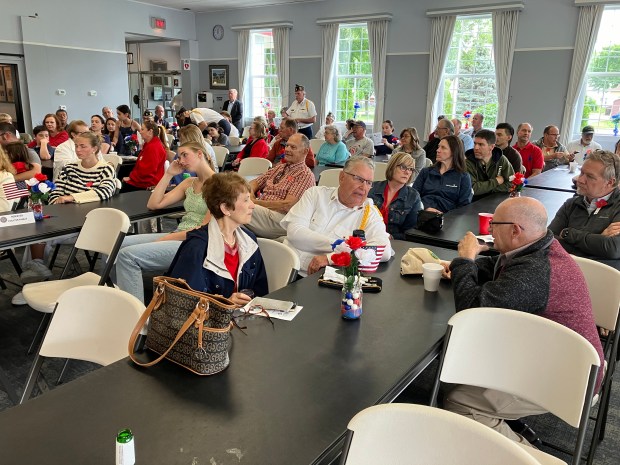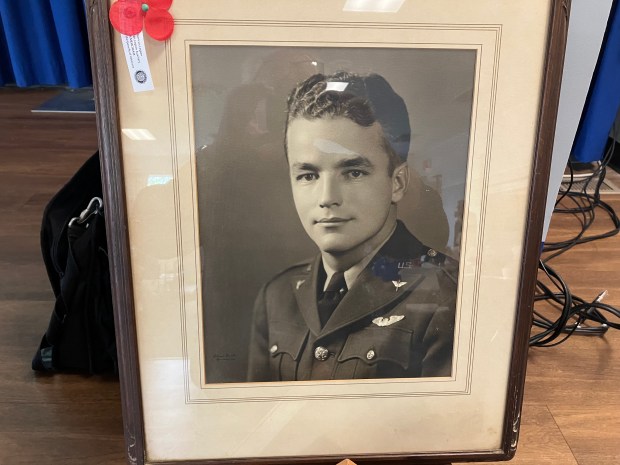Robert Coulter American Legion Post 1941 marked its 80th anniversary Memorial Day with a commemorative celebration attended by more than 100 people.
Among those in attendance were several family members of Robert E. Coulter Jr., the La Grange native and Army Air Corps pilot who lost his life on Feb. 1, 1943, in a B-17 Flying Fortress in a bombing mission over North Africa.
“It’s an honor to our uncle that we did not know, but also to our Dad who fought in World War 11 and was highly active in this Post, as was our Mother,” Coulter’s niece Bonnie Williams said. “We grew up around the Post and several past presidents, so it’s an honor to be here to represent them because they’re all gone now.”
Her sister, Ann Shaw, echoed Williams’ sentiments.
“These are my ancestors,” she said. “I wasn’t born until 1947, and he was killed in ’43. But all my life I have heard stories about Uncle Bob … Memorial Day is always special because we’re here to remember.”
Post Commander Michael Maher welcomed the people gathered, a memorial wreath was laid by Williams and Shaw, a roll call of La Grange natives who have lost their lives in battle was read, and a three-gun salute was given before the playing of Taps and a benediction by the Chaplain.
But the heart of the celebration was Vice Commander Bill Kiddon recapping the events leading up to Lt. Colonel Coulter’s death.
“Everything we’re going to share with you is factual, accurate, and came from military records,” he said, noting that Post 1941 began in June of 1944, and got its post number from the year America entered the conflict.
Kiddon told of how Coulter graduated from Lyons Township High School, attended Purdue University, and enlisted in the Army Air Corps after the German Army invaded Poland in 1939.
“He was ready and he wanted to go,” Kiddon said, stressing that Coulter was not just another of the many brave American flyers of the day, but a commander of a B-17 squadron.
Coulter was among the first pilots to fly unescorted bombing missions because of the lack of fighter escorts, but refused to rotate out of combat after the 25 missions which were the standard by which the Army relieved pilots of combat duty.
He flew 35 missions in all and was credited with bombing Nazi submarine pens, destroying a Nazi U-Boat base, and leading critical bombing missions in North Africa to prevent the Nazis from seizing critical oil fields.
“These were very strategic missions that required pinpoint accuracy,” Kiddon said, pointing out that on his last mission, Coulter volunteered to co-pilot for another pilot that he had trained as a squadron leader.
The attack successfully took out oil fields in Tunisia, but met with attacking Messerschmitt 109s on the way home, one of which sawed off the wing of the B-17, sending the plane spiraling out of control and crashing.
Coulter was buried overseas and posthumously awarded a Silver Star, an Army Air Medal, and a Purple Heart.

Nancy Kenney, former Village Trustee and direct descendant of La Grange founder Franklin D. Cossitt, listened to Kiddon with rapt attention, afterward saying the loss suffered by so many during the most devastating war of the Twentieth Century was familiar to her.
Her father, William Mabin, a lifelong La Grange resident and graduate of Lyons Township High School, was killed with 86 of his shipmates on the USS Lagarto, the submarine lost after a battle with a Japanese convoy in the Gulf of Thailand.
“It’s a very important day to me,” she said. “We know first-hand what it’s like to lose someone, even though I was only two years old and he was 26…it’s still a loss.”
La Grange Village President Mark Kuchler was in attendance, as were Village Trustee Glenn Thompson and Village Clerk Paul Saladino.
“This really shows the commitment that the families have to La Grange and the multiple generations that stay in La Grange and stay active in La Grange,” Kuchler said. “It’s just wonderful, their commitment.”
Post 1941 Commander Michael Maher spoke of the sacrifices made by so many American service members.
“This sweetness of enduring peace has always been tainted by the bitterness of personal sacrifice,” he said. “We are compelled to never forget that while we enjoy our daily pleasures, there are others who have endured, and may be enduring, the agonies of pain, deprivation, and imprisonment.”
Hank Beckman is a freelance reporter for Pioneer Press.





